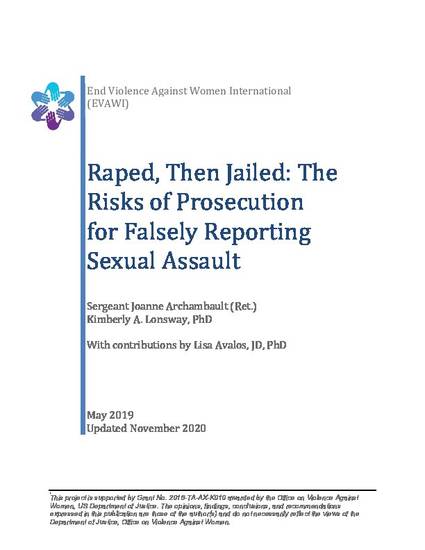
Article
Raped Then Jailed: The Risks of Prosecution for Falsely Reporting Sexual Assault
End Violence Against Women International
(2020)
Abstract
In 2018, the media documented that over the last five years, at least 127 American women were charged with falsely reporting a sexual assault, or other crimes associated with false reporting. This is in addition to more than 200 women who have been similarly prosecuted in the UK; many of these women were imprisoned for two years or more. Without examining the case materials, it is impossible to make a determination about the legitimacy of these charges. However, we urge caution when pursuing this course of action, given the many misconceptions about sexual assault, and the devastating consequences of being wrong.
Women charged with these crimes have received prison sentences of up to ten years, and girls have been sent to juvenile detention facilities, setting their lives on a difficult and dangerous course. Severe consequences are also seen at work and school, in families and communities. At least one woman who was charged with falsely reporting committed suicide days before her trial was scheduled to begin, and many more have done so after facing the torment of skepticism and blame following a sexual assault.
In a prior Training Bulletin (Interviews with Victims vs. Suspects: Start by Believing and the Question of Bias), we explored the bias that sexual assault victimsoften face, based on unjustified suspicions that their report is a false allegation. We also described the all-too-common situation where someone reports a sexual assault, but the information they provide during the investigation is used against them. For example, victims who report their sexual assault may end up facing disciplinary action or criminal charges for underage drinking, recreational drug use, or involvement in the sex trade.
In this article, we focus on the scenario where victims summon the courage to report a sexual assault, only to be disbelieved, mistreated, and later charged (often erroneously) with false reporting or associated crimes such as obstruction of justice, interfering with law enforcement, or providing false statements. Some have even been charged with a felony crime of evidence tampering, for obtaining a medical forensic examination. In other words, the evidence they are accused of tampering with is their very own body.
Keywords
- sexual assault investigation,
- sexual assault,
- police,
- disbelieving victims,
- start by believing
Disciplines
Publication Date
November, 2020
Citation Information
Joanne Archambault, Kimberly A. Lonsway and Lisa Avalos. "Raped Then Jailed: The Risks of Prosecution for Falsely Reporting Sexual Assault" End Violence Against Women International (2020) Available at: http://works.bepress.com/lisa_avalos/12/
